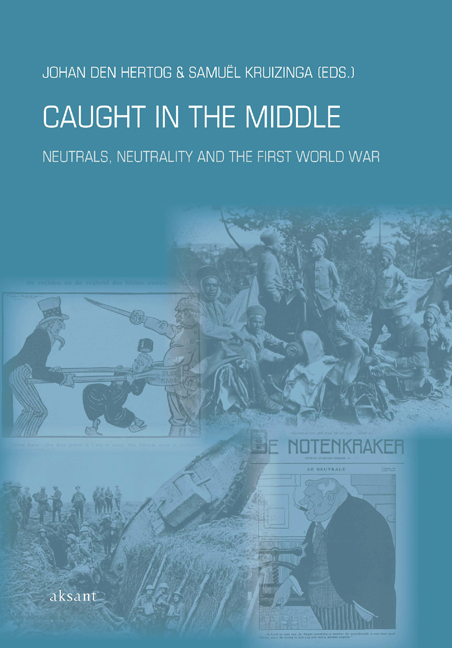Book contents
- Frontmatter
- Contents
- Acknowledgements
- Chapter 1 Introduction
- Chapter 2 Dutch Neutrality and the Value of Legal Argumentation
- Chapter 3 ‘Upon the Neutral Rests the Trusteeship of International Law’: Legal advisers and American unneutrality
- Chapter 4 Spanish Neutrality During the First World War
- Chapter 5 Britain’s Global War and Argentine Neutrality
- Chapter 6 NOT Neutrality: The Dutch government, the Netherlands Oversea Trust Company, and the Entente blockade of Germany, 1914-1918
- Chapter 7 From Parasite to Angel: Narratives of neutrality in the Swedish popular press during the First World War
- Chapter 8 Colour-blind or Clear-sighted Neutrality?: Georg Brandes and the First World War
- Chapter 9 The Hottest Places in Hell?: Finnish and Nordic neutrality from the perspective of French foreign policy, 1900-1940
- Chapter 10 The Other End of Neutrality: The First World War, the League of Nations, and Danish neutrality
- About the Contributors
Chapter 3 - ‘Upon the Neutral Rests the Trusteeship of International Law’: Legal advisers and American unneutrality
Published online by Cambridge University Press: 28 January 2021
- Frontmatter
- Contents
- Acknowledgements
- Chapter 1 Introduction
- Chapter 2 Dutch Neutrality and the Value of Legal Argumentation
- Chapter 3 ‘Upon the Neutral Rests the Trusteeship of International Law’: Legal advisers and American unneutrality
- Chapter 4 Spanish Neutrality During the First World War
- Chapter 5 Britain’s Global War and Argentine Neutrality
- Chapter 6 NOT Neutrality: The Dutch government, the Netherlands Oversea Trust Company, and the Entente blockade of Germany, 1914-1918
- Chapter 7 From Parasite to Angel: Narratives of neutrality in the Swedish popular press during the First World War
- Chapter 8 Colour-blind or Clear-sighted Neutrality?: Georg Brandes and the First World War
- Chapter 9 The Hottest Places in Hell?: Finnish and Nordic neutrality from the perspective of French foreign policy, 1900-1940
- Chapter 10 The Other End of Neutrality: The First World War, the League of Nations, and Danish neutrality
- About the Contributors
Summary
In 1914, many considered the United States to be the world's leading neutral nation. Neutrality and nonentanglement in European affairs formed a tradition virtually as old as the republic itself. When war broke out in Europe, the country seemed well positioned to maintain this stance. The commitment to neutrality was popular. The president, Woodrow Wilson, was officially devoted to it. Moreover, picking a side in the war was also fraught with domestic political danger: it was hard to predict how the large number of recent immigrants of diverse ethnicities, who maintained close ties with their homelands, would react in such a situation. Finally, the country had enough power to defend its neutral rights against any belligerent.
Nevertheless, not only did the u.s. eventually enter the war in April, 1917, but critics contend that it was effectively ‘unneutral’ by mid-1915. Those critics point to the fact that almost all American exports of munitions and other crucial goods, such as foodstuffs and raw materials, went to the Allies, and very few to the Central Powers. Moreover, they contend that the Wilson administration did too little to resist the expansive – and illegal – British blockade that enforced this imbalance. Meanwhile, the u.s. categorically rejected Germany's attempts to use submarines to intercept Allied shipping. And, unlike small European neutrals (such as Belgium or Greece) who abandoned neutrality only under belligerent duress, America entered the war of its own volition. Defenders of Woodrow Wilson's wartime policy dispute elements of this account. While everyone agrees that American policy disproportionately benefited the Allies, some deny allegations that this policy was illegal or that meaningful alternatives existed. Wilson's motivations remain similarly contested. Nevertheless, the best recent analysis makes a powerful case that American policy failed to uphold a ‘strict neutrality.’
Behind American unneutrality, most critical accounts suggest, lay a disregard for international law. Britain's seizures of American shipping violated clearlydefined neutral rights. By failing to protest adequately, the United States abandoned a viable legal case and allowed British malfeasance to persist. If policymakers had only followed unbiased legal advice, America could and would have remained neutral.
To evaluate these claims, this paper analyzes four legal advisers to the Department of State: Robert Lansing, James Brown Scott, Chandler P. Anderson, and Eugene Wambaugh. Lansing served as Counselor, the Department's chief legal position. For advice, he turned to Anderson and Wambaugh, and, especially, to Scott.
- Type
- Chapter
- Information
- Caught in the MiddleNeutrals, Neutrality and the First World War, pp. 35 - 52Publisher: Amsterdam University PressPrint publication year: 2012

